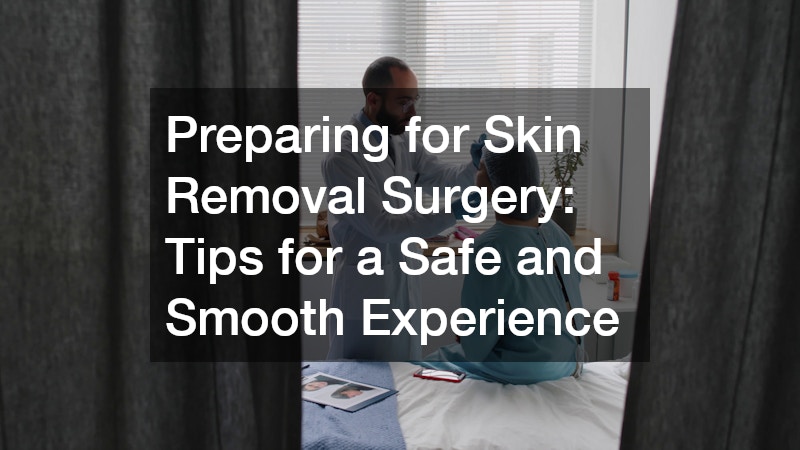Skin removal surgery, also known as body contouring or post-weight-loss surgery, is an important step for many individuals looking to achieve a more toned and proportionate appearance after significant weight loss. Whether you’ve undergone bariatric surgery, achieved your weight-loss goals through diet and exercise, or are addressing loose or excess skin from aging or pregnancy, preparing properly for surgery can significantly impact your recovery, safety, and final results. Let’s walk through essential tips and guidelines to help you prepare for skin removal surgery, ensuring a smooth experience and optimizing your outcomes.
Understand the Procedure and Set Realistic Expectations
Skin removal surgery encompasses a variety of procedures, including tummy tucks, arm lifts, thigh lifts, and full-body lifts. Each procedure targets specific areas of excess skin and may include fat removal or muscle tightening.
Before your surgery, it’s crucial to have a thorough consultation with a board-certified plastic surgeon. Discuss your goals, desired results, and potential limitations. Understanding what the procedure can realistically achieve helps set expectations and reduces the risk of disappointment.
Take time to ask questions about:
-
The surgical technique your surgeon recommends
-
Incision locations and potential scarring
-
Expected recovery timeline
-
Risks and potential complications
Having a clear understanding of your surgery helps you mentally and emotionally prepare for the process.
Achieve a Stable and Healthy Weight
One of the most important factors for a successful skin removal surgery is weight stability. Surgeons typically recommend being at or near your target weight for several months before undergoing surgery. Significant weight fluctuations after surgery can compromise results, stretch the skin, and increase the risk of complications.
Maintaining a balanced diet and consistent exercise routine in the months leading up to surgery not only improves your surgical outcomes but also promotes overall health, which can aid in healing.
Optimize Your Nutrition
Proper nutrition is a key component of pre-surgical preparation. Your body needs essential nutrients to heal efficiently and reduce the risk of complications. Focus on:
-
Protein: Essential for tissue repair and collagen production. Include lean meats, fish, eggs, dairy, beans, and nuts.
-
Vitamins and minerals: Vitamins A, C, D, and zinc support immune function and tissue healing. Consume fruits, vegetables, and whole grains.
-
Hydration: Drink plenty of water to keep your tissues hydrated and support circulation.
Avoid alcohol and limit processed foods, refined sugars, and excessive salt intake. A nutrient-rich diet helps your body handle the stress of surgery and recover more quickly.
Stop Smoking and Limit Alcohol
Smoking significantly increases the risk of surgical complications, including poor wound healing, infection, and reduced blood flow to tissues. Most surgeons recommend quitting smoking at least 4 to 6 weeks before surgery and continuing through the recovery period.
Alcohol should also be limited or avoided before surgery, as it can interfere with anesthesia, medications, and the body’s healing process. Abstaining from both smoking and alcohol ensures that your body is in optimal condition for surgery.
Prepare Your Home for Recovery
Recovery from skin removal surgery requires rest and limited mobility in the first few days. Preparing your home ahead of time makes this process much easier:
-
Arrange a comfortable resting area with pillows, blankets, and easy access to essentials like medications, water, and snacks.
-
Prepare meals in advance or arrange for help with cooking. Nutritious, soft foods can simplify recovery.
-
Remove hazards that could cause slips or trips, particularly if you need to navigate stairs or move slowly post-surgery.
-
Enlist support from family or friends to assist with daily tasks, transportation to appointments, and personal care.
Planning ahead reduces stress and allows you to focus entirely on healing.

Follow Pre-Operative Instructions
Your surgeon will provide a detailed set of pre-operative instructions that are critical for safety and successful surgery. These may include:
-
Fasting requirements before anesthesia
-
Adjusting or stopping certain medications or supplements
-
Guidelines for bathing or preparing your skin
-
Instructions for post-operative garments or compression wear
It’s essential to follow these instructions exactly. Deviating from them can increase the risk of complications such as infection, bleeding, or delayed healing.
Understand the Recovery Process
Knowing what to expect during recovery helps you prepare mentally and logistically. Most skin removal procedures involve:
-
Swelling and bruising in the treated areas
-
Temporary discomfort or tightness
-
Limited mobility for the first few days or weeks
-
Wearing compression garments to support healing and reduce swelling
-
Gradual resumption of daily activities over several weeks
Your surgeon will provide a timeline for returning to work, exercise, and other normal activities. Being prepared for these temporary limitations allows you to plan ahead and ensures a smoother recovery experience.
Mental and Emotional Preparation
Surgery can be both physically and emotionally taxing. Preparing your mind is just as important as preparing your body.
-
Set realistic expectations for your appearance during recovery; swelling and bruising are normal.
-
Practice stress-reduction techniques, such as deep breathing, meditation, or gentle yoga (if cleared by your surgeon).
-
Lean on your support system for encouragement and assistance.
Maintaining a positive mindset can improve your overall experience and promote healing.
Skin removal surgery is a significant step in achieving your ideal body shape, especially after major weight loss. By preparing your body, mind, and environment ahead of time, you can reduce complications, recover more comfortably, and optimize your results. Key steps for a safe and smooth experience include: maintaining a stable weight, focusing on proper nutrition, quitting smoking and limiting alcohol, preparing your home, following your surgeon’s instructions, and understanding your recovery process. When you take these preparation steps seriously, you set yourself up for a more successful surgery, a faster recovery, and beautiful, long-lasting results. Proper preparation ensures that your body is ready to heal efficiently and that you can enjoy the confidence and transformation that comes with skin removal surgery.


